 Expert's opinion
Expert's opinion
The article is a subjective view on this topic written by writers specializing in medical writing.
It may reflect on a personal journey surrounding struggles with an illness or medical condition, involve product comparisons, diet considerations, or other health-related opinions.
Although the view is entirely that of the writer, it is based on academic experiences and scientific research they have conducted; it is fact-checked by a team of degreed medical experts, and validated by sources attached to the article.
The numbers in parenthesis (1,2,3) will take you to clickable links to related scientific papers.
Athletic Greens Review 2024: Is It Worth Buying?
All articles are produced independently. When you click our links for purchasing products, we earn an affiliate commission. Learn more about how we earn revenue by reading our advertise disclaimer.
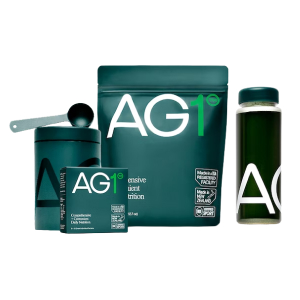
8.0
Quality
8.0
Support Research
10.0
Reputation
9.0
Price
Features
- Free of major allergens
- 90-day money-back guarantee
- Rigorously tested to be NSF for Sport Certified
- Fits into many dietary lifestyles
- Powder is easily digestible and easy on the stomach
Brand Information
- Founded in 2010
- Made in New Zealand
- Athlete and health experts recommended
- AG1 has been Climate Neutral Certified since 2021
Medical Benefits
- Helps Exercise Recovery
- Aids Digestion
- Supports Immunity
- Supports Efficient Energy Production & Storage
- Supports Nervous System
- Supports Liver Function
- Supports Hormone Function
About The Brand
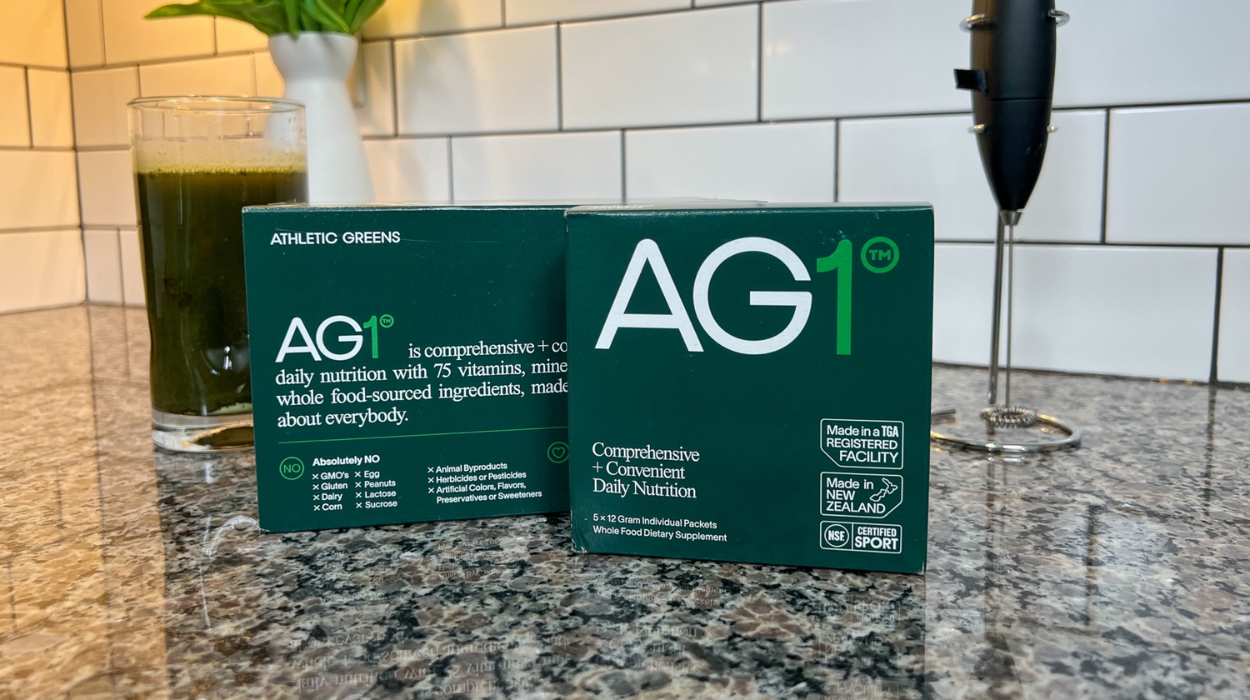
Athletic Greens Review – Athletic Greens was founded by Chris Ashenden in 2010 as a way to improve his nutrition while dealing with digestive and gut health issues. This company is based in New Zealand, and its products are manufactured in a TGA-registered, NSF GMP Registered facility.
The mission of the Athletic Greens brand is to empower people to take ownership of their health. This brand has a strong reputation and has been endorsed by professional athletes and health experts for its benefits.
What Are Athletic Greens? Is It Organic?

Athletic Greens is a foundational nutritional drink formulated to be easily digestible and useful for athletes and non-athletes alike to have comprehensive and convenient daily nutrition.
The proprietary blends in Athletic Greens contain some organic ingredients, but it is not an organic product overall. Athletic Greens are formulated with high-quality organic and non-organic ingredients.
Feature Product & Coupon

Athletic Greens
- Friendly for a variety of dietary lifestyles
- Free of major allergens
- NSF Certified for Sport
- 90-day return policy
- Uncertain if ingredients are in clinically relevant doses
- Expensive compared to other plant-based green juice powders
- May cause gastrointestinal side effects
Does It Really Work? – Athletic Greens Review 2024
The ingredients in AG1 deliver benefits backed by peer-reviewed scientific literature. The quantities are not only based on the research around each individual ingredient but also on ways they amplify each other and work together synergistically.
Thousands of studies were reviewed by the medical research team as part of the formulation and continuous improvement process for AG1. These studies are globally conducted peer-reviewed studies and publicly available through the U.S. National Institutes of Health.
One clinical trial[1] found that supplementation with green vegetable juices for three weeks could be beneficial for patients with high cholesterol.
Another study[2] found that plant-based greens powder could increase the antioxidant potential of the blood, potentially reducing the risk of chronic illnesses caused by oxidative stress.
Most users of Athletic Greens review that they have improved energy, healthier hair, skin, and nails, improvements in gut health, better mental clarity, and other overall health benefits.
Athletic Greens Nutrition Facts – Athletic Greens Ingredient

Athletic Greens is a nutritionally complete supplement that contains a whopping 75 ingredients in its comprehensive formula consisting of vitamins, minerals, and whole-food sourced nutrients. It features 21 vitamins and minerals, an Alkaline, Nutrient-Dense Raw Superfood Complex, a blend of Nutrient-Dense Extract, Herbs and Antioxidants, a Digestive Enzyme & Super Mushroom Complex, and Dairy-Free Probiotics.
Together Athletic Greens ingredients support hormonal function, immunity, digestion, exercise recovery, and daily energy. Many of the ingredients in Athletic Greens have substantial research to support their benefits, which makes this product likely worth your money.
This review will cover a general overview of the supplement and focus on a few ingredients from each proprietary blend.
Each serving provides 50 calories, 6 g total carbohydrates, 2 g dietary fiber, and 2 g protein.
Vitamin And Mineral Blend
The vitamin and mineral blend contains 21 vitamins and minerals in their optimally absorbable forms to support a healthy immune system and nervous system. Some nutrients are in doses greater than 100% of the Daily Value, including thiamin, vitamin E, biotin, and vitamin B12.
- Alkaline, Nutrient-Dense Raw Superfood Complex: This superfood complex is packed full of ingredients that reportedly provide an antioxidant content equivalent to approximately 12 servings of fruits and vegetables. Some ingredients include organic spirulina, rosehip (Rosa canina), green vegetables, and organic chlorella.
- Nutrient-Dense Extracts, Herbs & Antioxidants: This blend contains adaptogenic herbs and nutrient-dense natural plant extracts to support hormonal function and antioxidant activity. Some included ingredients are ashwagandha, citrus bioflavonoids extract, and vitamin K2.
- Digestive Enzyme & Super Mushroom Complex: The digestive enzyme and mushroom complex helps digestive health, nutrient absorption, and immune function. This blend includes ingredients like the digestive enzyme bromelain, burdock root, reishi mushroom powder, shiitake mushroom powder, and astragalus root powder.
- Dairy-Free Probiotics, 7.2 billion CFUs: Probiotics are included to support gut health, nutrient absorption, and a stronger immune system. Athletic Greens contain both Lactobacillus acidophilus – UALa-01 and Bifidobacterium bifidum-UABb-10.
B Vitamins
B vitamins are water-soluble vitamins that are essential to energy production, neurotransmitter synthesis, blood cell function, and cellular health. Deficiencies of these vitamins can lead to neurological damage, cognitive dysfunction, and anemia.
B vitamin supplementation in people with nutrient deficiencies is shown in studies[3] to be effective in improving fatigue, mood and attention, and cognitive function.
Athletic Greens’ ingredient list contains several B vitamins in their most absorbable form to prevent deficiencies. For example, this supplement contains the natural form of B12 methylcobalamin instead of cyanocobalamin. Folate is present as 5-MTHF, which is more absorbable for people who have the MTHFR gene mutation.
Several B vitamins in Athletic Greens are present in doses that are over 100% of the Daily Value. For most of these vitamins, there is not an established Upper Limit[4] for intake, but high doses of niacin[5] and vitamin B6[6] can be toxic.
Vitamin E
Vitamin E is one of the fat-soluble vitamins and acts as an antioxidant in the body. The form of vitamin E in Athletic Greens, d-alpha-tocopherol succinate, can inhibit inflammatory cytokine production[7] and maybe protect against cancer and tumor growth.[8]
This product provides over 500% of the recommended Daily Value of vitamin E (83 mg per serving). The Upper Limit for vitamin E intake is 1,000 mg/day, but toxicity for vitamin E[9] can occur at intakes of 720 mg to 3,200 mg/day.
Symptoms of vitamin E toxicity are usually mild but may include gastrointestinal complaints and impaired blood coagulation. People who take anticoagulants, antiplatelet medications, or cancer-treatment medications should consult a healthcare practitioner due to possible medication interactions.
Chlorella
Chlorella is a type of freshwater algae. It is nutrient-rich and contains vitamins, minerals, amino acids, omega-3 fatty acids, and fiber. Studies find that organic chlorella powder is beneficial[10] for controlling blood sugar, and elevated blood lipids, protecting against oxidative stress, supporting liver function,[11] and reducing chronic disease risk.
Rose Hips
Rose hips are the seed pods of the rose plant. They have strong antioxidant activity[12] and are high in vitamin C, polyphenols, carotenoids, and other antioxidants.
While not all of these benefits have been confirmed by clinical studies, recent research[13] suggests that rose hips can support the longevity of cells, improve skin health, may protect against gastric inflammation, supports kidney and liver health, protects the nervous system, reduce weight gain, reduces symptoms of arthritis, protects against cancer, and reduces inflammation.
Ashwagandha
Ashwagandha is an adaptogenic root traditionally used in Ayurvedic Medicine, a healthy lifestyle system used by people in India for over 5,000 years. In clinical studies,[14] ashwagandha extract may support mental function by improving attention, performance on cognitive tasks, attention, and cognitive reaction time.
Ashwagandha may also support hormonal balance. Studies show that ashwagandha can help balance reproductive hormones[15] and improve symptoms of anxiety and stress.[16]
Vitamin K2
Vitamin K2 is a fat-soluble vitamin that is produced by gut bacteria. This vitamin is important for maintaining normal blood clotting, calcium metabolism, bone health, and supporting heart health.
Studies find[17] that supplementation with vitamin K2 can reduce coronary heart disease, decrease arterial stiffening, reduce all-cause mortality, and improve bone density to reduce fracture risk.
Bromelain
Bromelain is an enzyme found in pineapple that can break down proteins to their amino acids.
Beyond its benefits for digestive health, bromelain is shown in animal and cell studies[18] to be effective in reducing inflammation, inhibiting microbial growth, protecting against cancer, reducing diarrhea, enhancing antibiotic activity, improving liver function, protecting against ulcers, supporting immune function, supporting blood circulation, and reducing swelling.
Astragalus
Astragalus root is an adaptogen traditionally used in Chinese medicine. It is well-known for its antioxidant activity and benefits against inflammation. Studies find that astragalus may protect against[19] tumors and certain gastrointestinal cancers. Other studies[20] support using astragalus to protect against oxidative stress and reduce the risk of organ tissue damage.
Lactobacillus Acidophilus – UALa-01
Lactobacillus acidophilus UALa-01 is a strain of L. acidophilus that is meant to be viable through the digestive tract.
Various strains of L. acidophilus are shown to be beneficial[21] for improving immune response, lowering cholesterol, improving gut health, and preventing infection. This bacteria may also be effective for weight management, though the research[22] results are inconsistent.
Bifidobacterium Bifidum-UABb-10
B. bifidum is one of the first bacteria types to colonize the human gut after birth. In one study,[23] supplementation with B. bifidum UABb-10 over 4 weeks was able to improve the frequency of stool and consistency in people with functional constipation.
Health Benefits Of Athletic Greens Review
Helps Exercise Recovery
Exercise recovery can be improved by reducing inflammation. Athletic Greens contains ingredients shown to reduce redness and swelling, reduce tissue inflammation, fight oxidative stress, and provide nutrients to ensure optimal performance through its nutrient-dense greens powders.
Aids Digestion
Digestion is supported by many of the ingredients present in Athletic Greens. Not only does this supplement have probiotics, but it also contains prebiotics, digestive enzymes, and ingredients that reduce gut inflammation.
Supports Immunity
Athletic Greens are filled with ingredients that reduce inflammation, prevent the overproduction of inflammatory cytokines, and support normal immune function.
Supports Efficient Energy Production & Storage
The vitamins and minerals in Athletic Greens are all needed for proper metabolism and energy production. Other adaptogenic herbs and ingredients may help improve energy, nutrient absorption, attention, and focus.
Supports Nervous System
Athletic Greens support the nervous system by providing the nutrients needed for neurotransmitters, adaptogens to help cognitive function, and antioxidants to reduce inflammation in the brain.
Supports Liver Function
Several ingredients in Athletic Greens are shown to reduce inflammation in tissues like the liver, and may even be protective against fatty liver disease.
Supports Hormone Function
Athletic Greens contain vitamins and minerals needed for the production of hormones and adaptogenic ingredients that help balance reproductive and stress hormones.
Athletic Greens Side Effects & Dosage
Each pouch or travel pack box contains 30 individual servings of Athletic Greens to last 30 days. A daily dose of Athletic Greens is one scoop of powder (12 g) mixed with 5-10 ounces of cold water. For optimal absorption of ingredients, take Athletic Greens in the morning on an empty stomach.
Athletes or individuals with significant life stressors can take up to two servings of Athletic Greens daily.
Common user-reported side effects from taking Athletic Greens include gastrointestinal symptoms such as nausea, diarrhea, bloating, and other digestive issues.
Children under the age of 18 should not take Athletic Greens without the approval of a medical professional. Individuals who are pregnant or breastfeeding, or taking medications should also consult with a medical professional before taking Athletic Greens.
Athletic Greens were formulated for athletes and are NSF Certified for Sport ®.
Athletic Greens are appropriate for all dietary lifestyles – it is vegetarian, vegan, paleo-friendly, keto-friendly, and low-carb.
Athletic Greens contain stevia leaf as a natural sweetener, so people who do not like the taste of stevia should be aware of this.
It is made with Non-GMO Ingredients and is free of herbicides, pesticides, artificial colors, flavors, preservatives, artificial sweeteners, gluten-free, dairy, corn, egg, peanuts, animal products, lactose, sucrose, and dextrose.
Athletic Greens Review: What Do Real Users Say?
Athletic Greens has an overall 4.7-star rating on its website, with mostly positive reviews. Athletic Greens negative review generally stated that the user did not experience any differences from taking Athletic Greens, felt that it was an expensive product, or did not like the taste.
“Absolutely amazing! I started taking it so that I would have more energy during the day and I for real do! So much so that my husband was eager to try it and now we are both on it every day!!”
Ashley N.
“I have felt really good since taking AG. I feel “even.” I used to experience energy sags late in the day, but I feel better, more energy. I combine this activity with exercise by climbing and I feel much healthier.”
Christopher B.
Where To Buy Athletic Greens?
If what you’ve read so far has got you wanting to try Athletic Greens, here’s where you can purchase this product.
Athletic Greens is available directly from the official website as a one-time purchase, monthly subscription, or double subscription. Subscribers get a discount on their purchases. We recommend trying a one-month purchase first so that you can determine if Athletic Greens is right for you.
There is a 90-day money-back guarantee available through their website if you’re not satisfied with your results.
Alternatives To Athletic Greens
Athletic Greens powder contains a unique formula that is not easily matched by the competition, but there are high-quality superfood green powder alternatives at a lower price point.
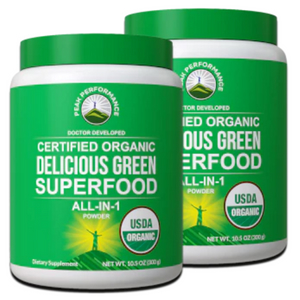
Peak Performance
- Supports immune health
- Helps with daily detox
- Supports weight management
- Available as travel packets
- Contains coconut
- May not be safe for people with autoimmune conditions
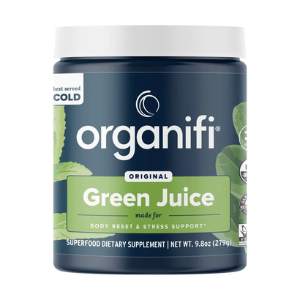
Organifi Green Juice
- Supports immune health
- Helps with daily detox
- Supports weight management
- Available as travel packets
- Contains coconut
- May not be safe for people with autoimmune conditions
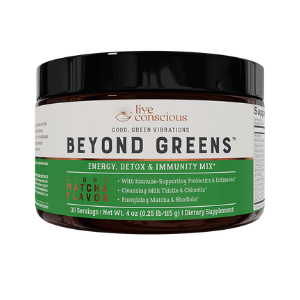
Live Conscious Beyond Greens
- Whole food supplement
- Supports immune function, energy, and detox
- Transparent about individual ingredient doses
- 365-day money-back guarantee
- Doesn’t have a good flavor
- Lacks third-party certification
Final Thought: Is Athletic Greens Worth It?
After considering Athletic Greens’ ingredients, the available research, the brand’s attention to quality, and its solid return policy, I believe that Athletic Greens may be worth buying.
Athletic Greens Review – It is somewhat pricier than other plant-based greens powders, but the cost is justified by its NSF testing, use of high-quality ingredients, and the number of ingredients included in its formula. Despite knowing this, we still recommend trying a one-month supply before committing to a subscription.
If you are the type of person who wants to boost your optimal health with a small daily commitment, Athletic Greens may be right for you. Athletic Greens has positive reviews from professional athletes, health experts, and other consumers.
Even if you don’t like it, you can always use their 90-day return.
Before you start taking dietary supplements, speak with a healthcare practitioner to be sure that they are safe for you.
Frequently Asked Questions
Athletic Greens help exercise recovery, aid digestion, supports a strong immune system, support efficient energy production and storage, support the nervous system, support liver function, and support hormone function.
People with nutrient deficiencies may see results from taking Athletic Greens in as little as a few weeks, but it may take at least a month before benefits are seen
With an overwhelmingly high rating from consumers, it appears that Athletic Greens may work for most people. The ingredients in Athletic Greens are supported by research to be beneficial.
Athletic Greens is safe to take, but you may experience some mild gastrointestinal side effects.
You can buy Athletic Greens on the brand’s website.
+ 23 sources
Health Canal avoids using tertiary references. We have strict sourcing guidelines and rely on peer-reviewed studies, academic researches from medical associations and institutions. To ensure the accuracy of articles in Health Canal, you can read more about the editorial process here
- Okita, M., Sasagawa, T., Kotani, M., Hayashi, M., Yamashita, H., Kimoto, M., Suzuki, K., Tsuji, H. and Tabei, T. (2000). Green vegetable juice increases polyunsaturated fatty acid of erythrocyte membrane phospholipid in hypercholesterolaemic patients. Asia Pacific Journal of Clinical Nutrition, [online] 9(4), pp.309–313. Available at: https://pubmed.ncbi.nlm.nih.gov/24394508/
- Tardy, A.-L., Pouteau, E., Marquez, D., Yilmaz, C. and Scholey, A. (2020). Vitamins and Minerals for Energy, Fatigue and Cognition: A Narrative Review of the Biochemical and Clinical Evidence. Nutrients, [online] 12(1), p.228. Available at: https://www.ncbi.nlm.nih.gov/pmc/articles/PMC7019700/
- Rao, V., Balachandran, B., Shen, H., Logan, A. and Rao, L. (2011). In Vitro and in Vivo Antioxidant Properties of the Plant-Based Supplement Greens+. International Journal of Molecular Sciences, [online] 12(8), pp.4896–4908. Available at: https://pubmed.ncbi.nlm.nih.gov/21954333/
- Institute of Medicine (US) Committee to Review Dietary Reference Intakes for Vitamin D and Calcium, A Catharine Ross, Taylor, C.L., Yaktine, A.L. and Del, H.B. (2011). – Dietary Reference Intakes for Calcium and Vitamin D – NCBI Bookshelf. [online] Nih.gov. Available at: https://www.ncbi.nlm.nih.gov/books/NBK56068/table/summarytables.t7/?report=objectonly
- Habibe, M.N. and Kellar, J.Z. (2021). Niacin Toxicity. [online] Nih.gov. Available at: https://www.ncbi.nlm.nih.gov/books/NBK559137/
- Hemminger, A. and Wills, B.K. (2021). Vitamin B6 Toxicity. [online] Nih.gov. Available at: https://www.ncbi.nlm.nih.gov/books/NBK554500/
- MAJIMA, D., MITSUHASHI, R., FUKUTA, T., TANAKA, T. and KOGURE, K. (2019). Biological Functions of α-Tocopheryl Succinate. Journal of Nutritional Science and Vitaminology, [online] 65(Supplement), pp.S104–S108. Available at: https://pubmed.ncbi.nlm.nih.gov/31619606/
- Savitskaya, M.A. and Onischenko, G.E. (2016). α-Tocopheryl succinate affects malignant cell viability, proliferation, and differentiation. Biochemistry (Moscow), [online] 81(8), pp.806–818. Available at: https://pubmed.ncbi.nlm.nih.gov/27677550/
- Kappus, H. (1992). Tolerance and safety of vitamin E: A toxicological position report. Free Radical Biology and Medicine, [online] 13(1), pp.55–74. Available at: https://www.sciencedirect.com/science/article/abs/pii/089158499290166E
- Panahi, Y., Darvishi, B., Jowzi, N., Beiraghdar, F. and Sahebkar, A. (2015). Chlorella vulgaris: A Multifunctional Dietary Supplement with Diverse Medicinal Properties. Current Pharmaceutical Design, [online] 22(2), pp.164–173. Available at: https://pubmed.ncbi.nlm.nih.gov/26561078/
- Ebrahimi-Mameghani M;Aliashrafi S;Javadzadeh Y;AsghariJafarabadi M (2014). The Effect of Chlorella vulgaris Supplementation on Liver En-zymes, Serum Glucose and Lipid Profile in Patients with Non-Alcoholic Fatty Liver Disease. Health promotion perspectives, [online] 4(1). Available at: https://pubmed.ncbi.nlm.nih.gov/25097844/
- Bhave, A., Schulzova, V., Chmelarova, H., Mrnka, L. and Hajslova, J. (2017). Assessment of rosehips based on the content of their biologically active compounds. Journal of Food and Drug Analysis, [online] 25(3), pp.681–690. Available at: https://www.sciencedirect.com/science/article/pii/S1021949817300492
- Ayati, Z., Amiri, M.S., Ramezani, M., Delshad, E., Sahebkar, A. and Emami, S.A. (2019). Phytochemistry, Traditional Uses and Pharmacological Profile of Rose Hip: A Review. Current Pharmaceutical Design, [online] 24(35), pp.4101–4124. Available at: https://pubmed.ncbi.nlm.nih.gov/30317989/
- Ng, Q.X., Loke, W., Foo, N.X., Tan, W.J., Chan, H.W., Lim, D.Y. and Yeo, W.S. (2019). A systematic review of the clinical use of Withania somnifera (Ashwagandha) to ameliorate cognitive dysfunction. Phytotherapy Research, [online] 34(3), pp.583–590. Available at: https://pubmed.ncbi.nlm.nih.gov/31742775/
- Nasimi Doost Azgomi, R., Zomorrodi, A., Nazemyieh, H., Fazljou, S.M.B., Sadeghi Bazargani, H., Nejatbakhsh, F., Moini Jazani, A. and Ahmadi AsrBadr, Y. (2018). Effects of Withania somnifera on Reproductive System: A Systematic Review of the Available Evidence. BioMed Research International, [online] 2018, pp.1–17. Available at: https://pubmed.ncbi.nlm.nih.gov/29670898/
- Pratte, M.A., Nanavati, K.B., Young, V. and Morley, C.P. (2014). An Alternative Treatment for Anxiety: A Systematic Review of Human Trial Results Reported for the Ayurvedic Herb Ashwagandha (Withania somnifera). The Journal of Alternative and Complementary Medicine, [online] 20(12), pp.901–908. Available at: https://pubmed.ncbi.nlm.nih.gov/25405876/
- Maresz, K. (2015). Proper Calcium Use: Vitamin K2 as a Promoter of Bone and Cardiovascular Health. Integrative medicine (Encinitas, Calif.), [online] 14(1), pp.34–9. Available at: https://www.ncbi.nlm.nih.gov/pmc/articles/PMC4566462/
- Chakraborty, A.J., Mitra, S., Tallei, T.E., Tareq, A.M., Nainu, F., Cicia, D., Dhama, K., Emran, T.B., Simal-Gandara, J. and Capasso, R. (2021). Bromelain a Potential Bioactive Compound: A Comprehensive Overview from a Pharmacological Perspective. Life, [online] 11(4), p.317. Available at: https://www.ncbi.nlm.nih.gov/pmc/articles/PMC8067380/
- Auyeung, K.K., Han, Q.-B. and Ko, J.K. (2016). Astragalus membranaceus: A Review of its Protection Against Inflammation and Gastrointestinal Cancers. The American Journal of Chinese Medicine, [online] 44(01), pp.1–22. Available at: https://pubmed.ncbi.nlm.nih.gov/26916911/
- Shahzad, M., Shabbir, A., Wojcikowski, K., Wohlmuth, H. and C. Gobe, G. (2016). The Antioxidant Effects of Radix Astragali (Astragalus membranaceus and Related Species) in Protecting Tissues from Injury and Disease. Current Drug Targets, [online] 17(12), pp.1331–1340. Available at: https://pubmed.ncbi.nlm.nih.gov/26343107/
- Bull, M., Plummer, S., Marchesi, J. and Mahenthiralingam, E. (2013). The life history of Lactobacillus acidophilusas a probiotic: a tale of revisionary taxonomy, misidentification and commercial success. FEMS Microbiology Letters, [online] 349(2), pp.77–87. Available at: https://academic.oup.com/femsle/article/349/2/77/533643
- Crovesy, L., Ostrowski, M., Ferreira, D.M.T.P., Rosado, E.L. and Soares-Mota, M. (2017). Effect of Lactobacillus on body weight and body fat in overweight subjects: a systematic review of randomized controlled clinical trials. International Journal of Obesity, [online] 41(11), pp.1607–1614. Available at: https://pubmed.ncbi.nlm.nih.gov/28792488/
- Martoni, C.J., Evans, M., Chow, C.T., Chan, L.S. and Leyer, G. (2019). Impact of a probiotic product on bowel habits and microbial profile in participants with functional constipation: A randomized controlled trial. Journal of Digestive Diseases, [online] 20(9), pp.435–446. Available at: https://pubmed.ncbi.nlm.nih.gov/31271261/



